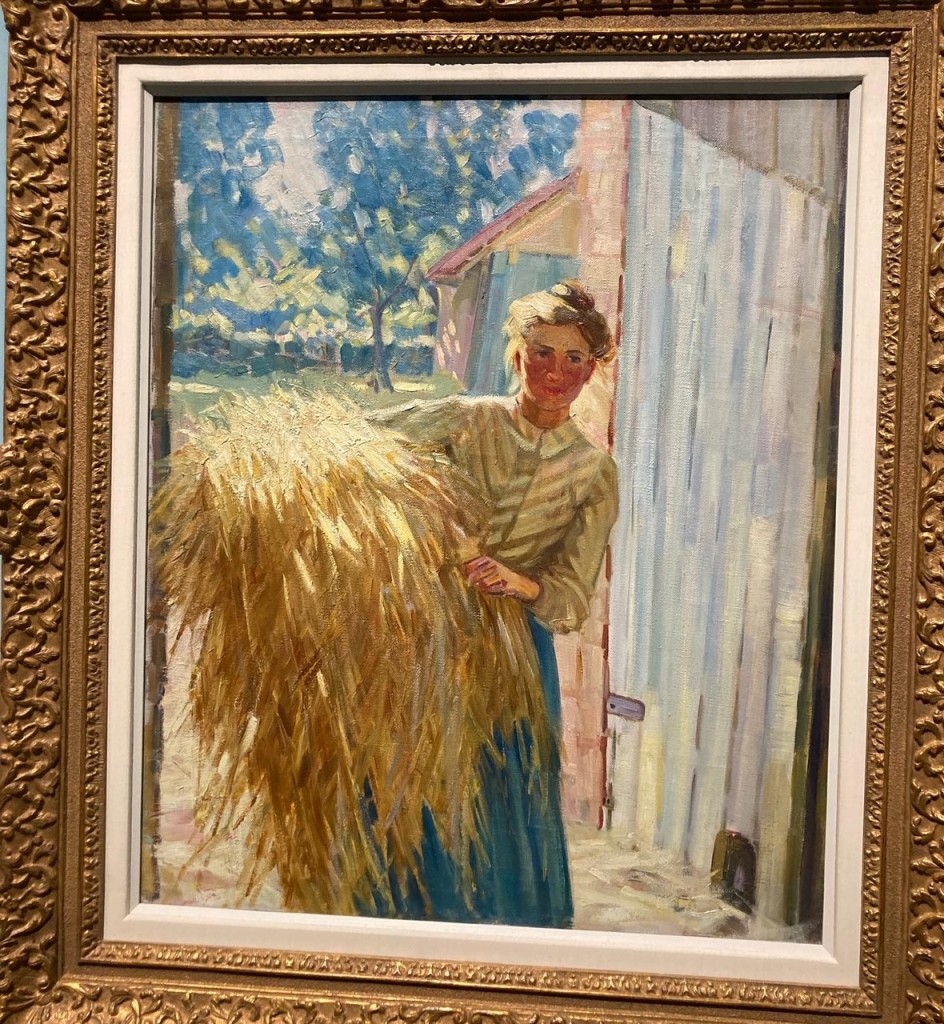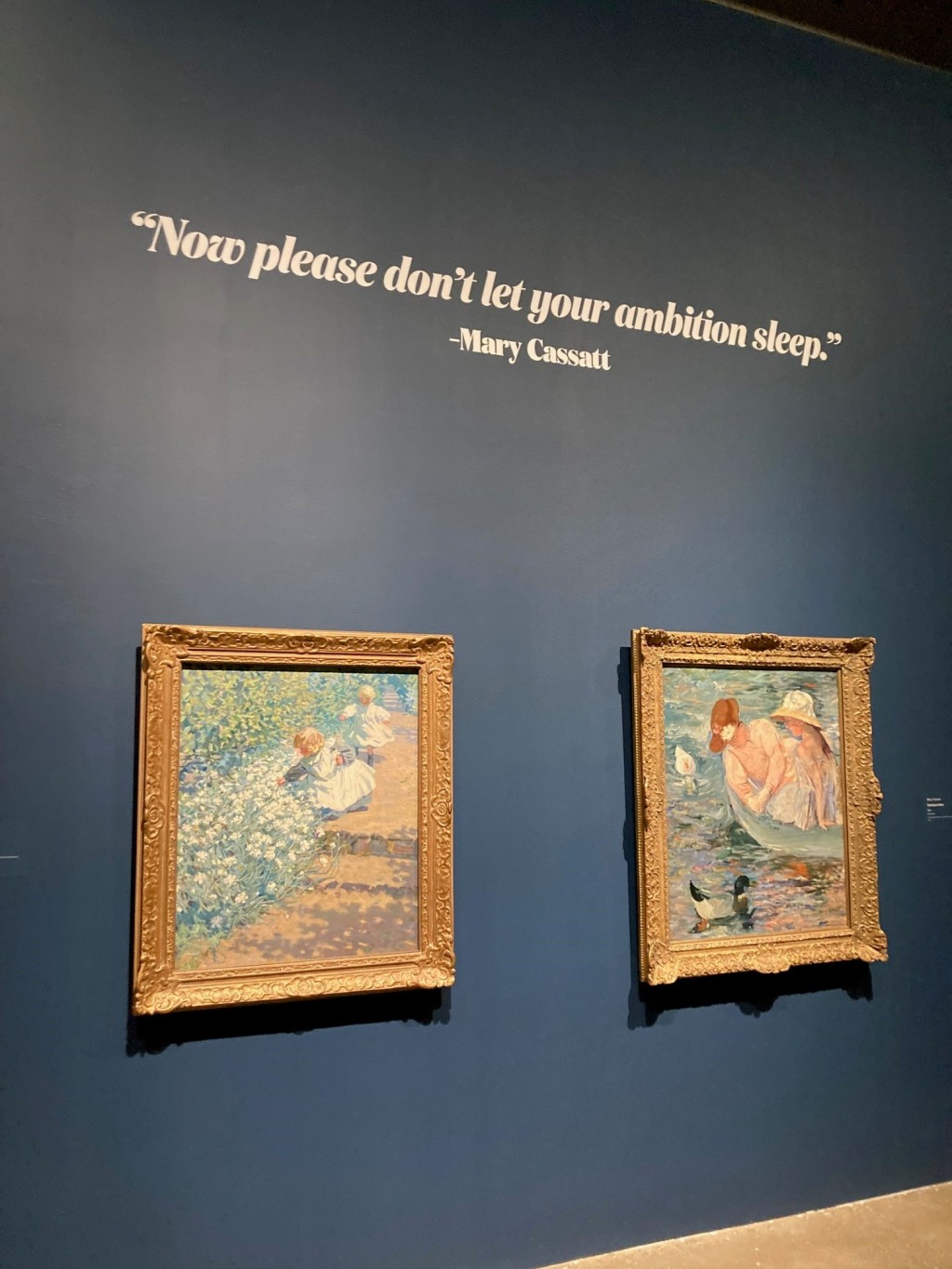During a recent quick trip to Toronto–my spouse had conference funding so I tagged along–I did a lot of museum-going. Several days and a hellish Air Canada odyssey later, what stays with me most is an exhibit in the Art Gallery of Ontario. It paired two women impressionists: the famous Mary Cassatt with a Canadian painter previously unknown to me, Helen McNicoll, who was deaf from the age of two and died young, at 35. They both painted mostly children and women, often at work–although the two paintings below show key differences, among them that the woman in McNicoll’s “The Gleaner” is flushed from laboring in the heat, while Cassatt’s scene in “Young Women Picking Fruit” is more genteel and allegorical (she was a suffragist interested in how women pass on knowledge to each other). I don’t know how art critics would describe their stylistic differences, but to me Cassatt’s work looks crisp and polished, while McNicoll’s conveys a swift hand at work, a joyful effort to capture a moment of shifting light.


Cassatt and McNicoll never knew each other, but both were navigating art worlds unfriendly to women painters, which must have required ambition, intense focus, and persistence as well as serious chops. Now I’m back home in Virginia and picking away at an author questionnaire from Tupelo Press for my next collection, Mycocosmic, scheduled for winter 2025, so I’m thinking about my own ambitions as well as my literary friendships, both deeply shaped by being a woman artist. If you’ve never had the pleasure, author questionnaires cover a lot of turf: affiliations; descriptions of the book for publicity materials; post-publication prizes you’re eligible for; lists of venues that might publish reviews or related pieces; friendly bookstores; and in this case, a reader’s guide for classes and book clubs. The only section that makes me say “yikes” is the one asking for ten friends who would hold launch parties or salons on your behalf. That’s a smart question but answering it makes me feel VERY presumptuous. I am grateful for my generous poetry-friends, mostly women, but they’re not salonnieres of leisure.
A lot of writers hate author questionnaires. I don’t. I have to get my thoughts together anyway about how I can help an ecopoetic book about women’s bodies, grief, witchiness, and fungi find audiences. It’s good to start early. But at least so far, I’m not feeling the anxious kind of ambition about Mycocosmic. I’m not sure if that’s because publication is far off or because I have exceptional confidence in this project or because I’m feeling older, which tends to shift the stakes. A bit of all three, probably.
Massachusetts Review recently published a spell-poem from the forthcoming book that’s very much about women’s bodies, grief, and witchiness (not fungi). “Message from the Next Life” is now available on their website with a recording (scroll down a bit and it’s on the right)–and the recording was hard to make, because it’s a tongue-twister of an alliterative sonnet! Another piece, first published in Kestrel, will be featured on Verse Daily sometime soon. And I’ve been corresponding with Mark Drew of The Gettysburg Review, who just took one of the Mycocosmic‘s best poems (I think) after some back-and-forth about revisions. He’s one of those rare solid gold editors who sees the better version of a poem within your good version and will take the time to coax it out. In this case, his edits made the poem a shade sadder. I’ve been writing mother-daughter poems that I wouldn’t have felt right about publishing before my mother’s death, but even now I can resist cutting down to the deepest darkness, it seems. For the poem’s sake, I’m glad he nudged me there.
Back to the sweaty gleaning. My concentration isn’t great in these dog days–I am worried about the burning, flooding world and still tired from a hard year–but I am damn persistent. And when I can’t be, I’m resolved to read my heart out. There’s a lot of poetry on my list for pseudo-Sealey-challenge days (I cannot read a book a day for 30 days in a row), but for now, I recommend a 2020 literary eco-apocalypse novel, Lydia Millet’s The Children’s Bible. I read it while grounded in an airport hotel, but it blew me away.

